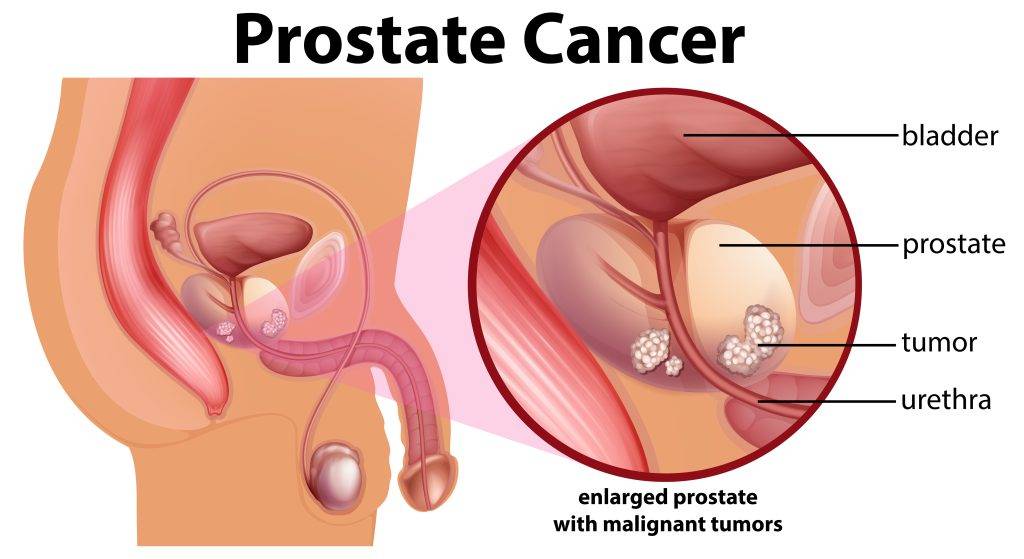Prostate cancer often flies under the radar, with symptoms men tend to ignore or misunderstand.
Prostate cancer affects millions of men worldwide, yet many hesitate to talk about it. Understanding the symptoms and seeking timely help could make all the difference.
To shed light on this men’s health issue, we spoke with Dr. Francis Chin Kuok Choon, a Radiation Oncologist at Icon Cancer Centre with nearly 25 years of experience treating various types of cancer.
What Is Prostate Cancer?
Prostate cancer starts in the prostate gland, a small organ about the size of a walnut.
“The prostate is a part of the male reproductive gland that sits just below the bladder. Its function is to form the seminal fluid, and it can become cancerous in elderly men.” shared Dr Chin.

Prostate cancer develops when cells in the prostate begin to grow abnormally and uncontrollably, forming a tumour. This tumour can remain localised within the prostate for years, causing no symptoms.
However, in some cases, these cancerous cells can spread to nearby tissues or travel to distant parts of the body, such as the bones and lymph nodes.
“Early prostate cancer remains inside the gland, but once it spreads beyond the prostate, it becomes advanced prostate cancer,”advised Dr Chin.
What makes prostate cancer unique is its range. Some types grow so slowly that they may never cause serious harm, while others are aggressive and life-threatening. This variability makes early detection through screening critical to identifying how best to manage the disease.
Symptoms of Prostate Cancer
Prostate cancer often develops silently, with no noticeable symptoms in its early stages. This can make it easy to overlook, but as the disease progresses, specific signs may emerge. Knowing these symptoms allows for early detection and timely treatment.
Dr Chin highlights the often silent nature of prostate cancer: “Early prostate cancer can be asymptomatic, which is why screening is so important.”
Urinary Symptoms
Changes in urination are some of the most common early signs, as the prostate’s location directly affects urinary function.
- Difficulty Starting or Stopping Urination: You might feel the urge but find it hard to begin or stop.
- Weak or Interrupted Urine Flow: A stream that slows or stops mid-flow is a potential warning.
- Increased Frequency of Urination: Especially during the night, this can disrupt sleep.
- Feeling of Incomplete Bladder Emptying: Even after going, you may still feel like you need to urinate.
- Pain or Burning During Urination: This can be a sign of irritation or blockage caused by an enlarged prostate.
- Blood in the Urine: This symptom is rare, but should never be ignored.
Sexual Dysfunction
Prostate cancer can affect sexual health in ways that might feel embarrassing to discuss, but recognising these symptoms is important:
- Erectile Dysfunction: Difficulty achieving or maintaining an erection might be an indicator.
- Pain During Ejaculation: Discomfort or a burning sensation during climax could signal an issue.
- Blood in Semen: Though uncommon, it can occur in some cases of prostate cancer.
Pelvic or Bone Pain
As prostate cancer progresses, it may spread to surrounding areas, leading to persistent discomfort, including:
- Pain in the Lower Back, Hips, or Thighs: This can indicate that the cancer has metastasised to the bones.
- Pelvic Pressure or Persistent Pain: General pelvic discomfort should not be ignored.
Advanced Symptoms
When prostate cancer reaches advanced stages, it can affect the entire body. Symptoms include:
- Unexplained Weight Loss: A sudden drop in weight without changes to diet or activity is concerning.
- Persistent Fatigue: Ongoing tiredness that does not improve with rest can signal systemic illness.
- Swelling in the Legs: This may result from blocked lymph nodes or blood flow disruption.
These symptoms can also overlap with less serious conditions, such as benign prostatic hyperplasia (BPH) or urinary tract infections (UTIs). However, ignoring them could delay diagnosis and treatment. If you experience any of these signs, consult a healthcare professional for evaluation.
Read more: How Dangerous Is Having an Enlarged Prostate (BPH)?
Causes of Prostate Cancer
Prostate cancer doesn’t have one single cause; instead, it results from a mix of genetic, environmental, and lifestyle factors. These influences vary across regions, but several key contributors stand out.
Genetic Factors
Your family history and genes can affect your chances of developing prostate cancer.
- Family History Plays a Role: If your father, brother, or other close male relatives had prostate cancer, your risk is higher. This is because you might inherit certain genes that make you more likely to develop it.
- Genetic Differences in Asian Populations: Research shows men in Asia may have unique genetic features, like specific changes in their DNA, which could slightly lower prostate cancer rates compared to Western countries.
- Mutations in DNA Repair Genes: Just like fixing a car, your body has systems to repair damaged DNA. Mutations in genes like BRCA1 and BRCA2 can stop these “repair tools” from working, increasing the risk of cancer.
Diet and Lifestyle
What you eat and how active you are can make a big difference in your risk of prostate cancer.
- Westernised Diets Raise Risks: Diets rich in red meat, fatty foods, and dairy products are linked to higher rates of prostate cancer. These are often called “Westernised” diets because they are more common in Western countries.
- Obesity and Inactivity: Being overweight or not getting enough exercise can lead to changes in your body’s metabolism, which might make prostate cancer more likely.
Hormonal and Metabolic Factors
Changes in your body’s hormones and metabolism can also play a role.
- Insulin Resistance: When your body stops responding to insulin properly (a condition linked to diabetes), it can cause changes that may increase cancer risk.
- Dyslipidaemia: This means having abnormal cholesterol levels. Cholesterol affects hormones like testosterone, which can influence prostate growth.
Infection and Inflammation
Long-term inflammation in the prostate might lead to cancer.
- Prostatitis and Infections: Conditions like prostatitis (prostate inflammation) or sexually transmitted infections can irritate the prostate over time. This ongoing irritation may cause the cells to change and eventually become cancerous.
Diagnosis and Treatment of Prostate Cancer

When it comes to prostate cancer, early detection and timely treatment are life-saving. Advances in diagnostic tools and treatment options provide hope for effective management.
Early Detection Methods
Early detection is crucial because prostate cancer often shows no symptoms in its early stages. According to Dr Chin, men over 45, especially those with a family history, should undergo regular screenings.
Prostate cancer is most treatable when caught early. These are the most common and effective methods for early detection:
- Prostate-Specific Antigen (PSA) Testing: A simple blood test measures PSA, a protein made by the prostate. Higher-than-normal levels can signal prostate cancer, though they can also be caused by other conditions.
- Digital Rectal Examination (DRE): During a DRE, a doctor feels the prostate through the rectum to check for lumps or irregularities. It’s often used alongside PSA testing for greater accuracy. However, it may not detect smaller or deeper tumours.
- Multiparametric MRI (mpMRI): This advanced imaging technique combines several MRI sequences to create detailed pictures of the prostate. It can identify suspicious areas that might need further investigation, such as a biopsy, and helps reduce unnecessary procedures.
- Biopsy Techniques: If cancer is suspected, a biopsy collects tissue samples from the prostate for analysis. Advanced methods, such as MRI-guided or ultrasound-targeted biopsies, focus on specific areas of concern to improve accuracy and reduce risks.
- Risk Stratification and Biomarkers: Modern tests like the 4Kscore, Prostate Health Index (PHI), and PCA3 gene test complement PSA screening, offering better insights into a patient’s cancer risk. Imaging agents targeting prostate-specific membrane antigen (PSMA) are especially effective at detecting aggressive cancers.
“This simple blood test (prostate specific antigen blood test), combined with a digital rectal examination, can detect cancer at its earliest, most treatable stages.” advises Dr Chin.
Treatment Options
Treatment for prostate cancer depends on the stage and aggressiveness of the disease, as well as the patient’s overall health and preferences.
- Active Surveillance: For low-risk or slow-growing cancers, doctors may recommend closely monitoring the condition without immediate treatment. Regular PSA tests, MRIs, and biopsies track the cancer’s progression.
- Surgery (Prostatectomy): Removing the prostate gland is a common option for localised cancer. Minimally invasive techniques, such as robotic-assisted surgery, improve precision and recovery times.
- Radiation Therapy: High-energy rays target and kill cancer cells. Modern methods, such as brachytherapy (implanting radioactive seeds), deliver radiation more precisely to minimise side effects.
- Hormone Therapy: Since prostate cancer often relies on testosterone to grow, hormone therapy reduces testosterone levels or blocks its effects. This treatment is usually for advanced or recurring cases.
- Chemotherapy: For cancers that have spread, chemotherapy uses drugs to destroy cancer cells throughout the body. It’s can be combined with other treatments for greater effectiveness.
- Targeted Therapy and Immunotherapy: Newer approaches focus on targeting specific cancer cells or boosting the immune system to fight the disease. Treatments like PSMA-targeted therapy and cancer vaccines are showing promise in advanced cases.
Combining Early Detection and Treatment
Prostate cancer is one of the most treatable cancers when detected early, but it requires you to take the first step. Regular check-ups, including PSA tests and DREs, can catch potential issues before they become serious.
Don’t ignore changes in your body—whether it’s trouble urinating, persistent fatigue, or pelvic discomfort. Discuss your risks with a doctor, especially if you have a family history of prostate cancer. Prioritising your health now could save your life later.
Prostate cancer outcomes improve dramatically with early detection, and screening is key.
“As Singapore’s population ages, more men will face prostate cancer. Early detection leads to higher cure rates and better outcomes with minimal side effects. Screening is not something to fear; it’s the first step toward protecting your health,” advises Dr Chin.
Learn more: Men’s Health FAQs: Answers to Questions You’re Too Afraid to Ask
